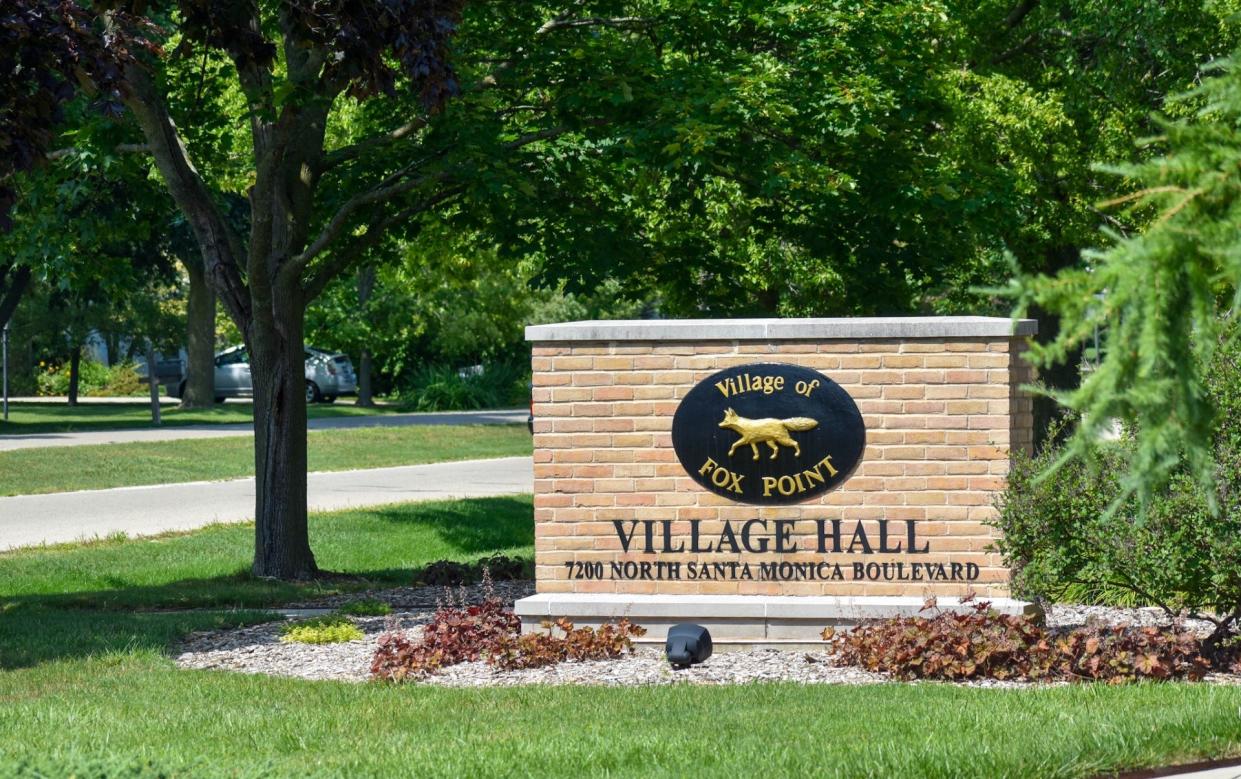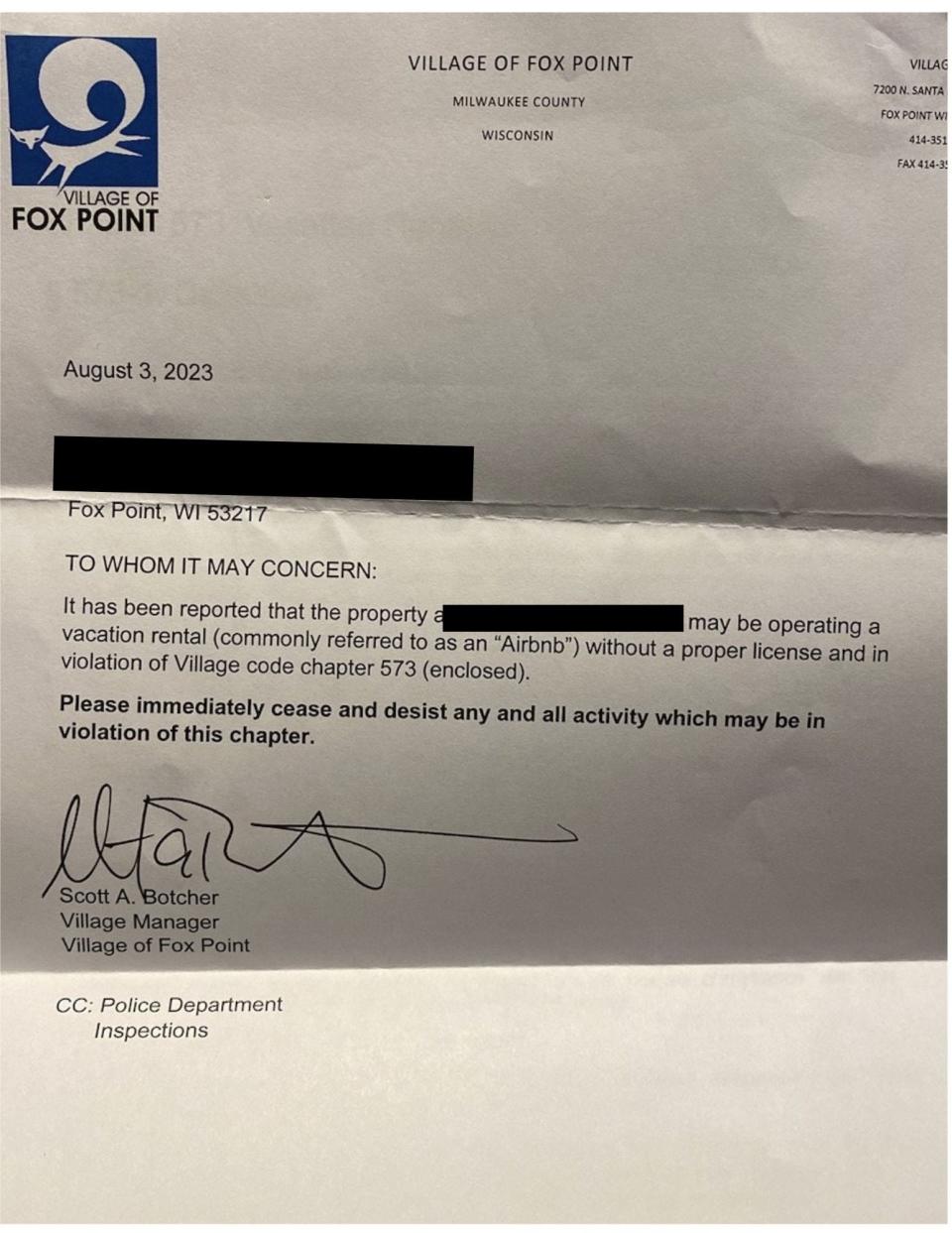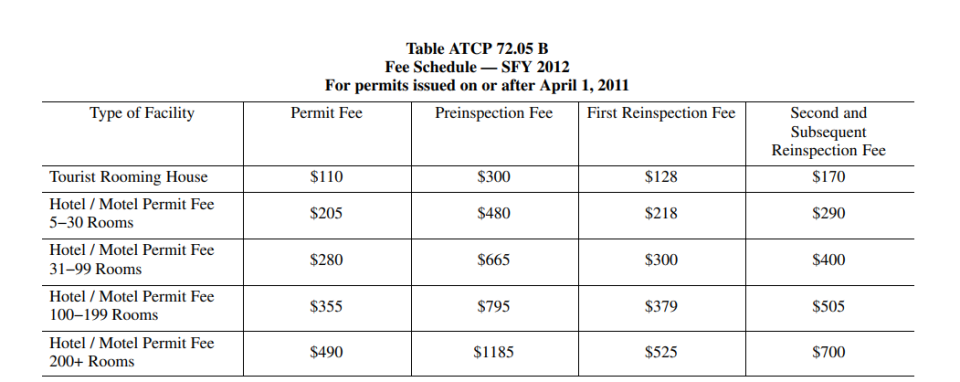A Fox Point Airbnb host thought she was within the law. Then she heard from the village.

A Fox Point homeowner rented out her home 18 times over the past three years through Airbnb. After complaints prompted the village to send her a cease-and-desist letter, the Fox Point resident of over 20 years wondered: why now?
"Several people know that I do this," said Sarah, who spoke on the condition that her last name be omitted to avoid bringing negative attention to her employer.
On Aug. 3, she received a letter from the village, with Fox Point police copied. The letter suspected she'd been hosting an Airbnb without the proper license required for rentals that operate 10 or more nights per year.
That's when Sarah realized she was lacking a $125 license that must be granted before each rental; it's been required by village code since 2019. None of the village's North Shore neighbors — Shorewood, Glendale, Whitefish Bay, River Hills, Brown Deer, or Bayside — require this.
Sarah said she takes responsibility for her mistake. But she wonders if others who rent out their homes in Fox Point are following these rules, especially when nearby North Shore renters don't have to.
Given that the complaints were seemingly sparked after she hosted Black families for the first time, she also wonders if the village code is enforced equally within Fox Point's predominantly white community.
Wisconsin's short-term rental laws were enacted in 2017, the same year Airbnb service in Wisconsin grew by 97%. Municipalities can make their own if they're in compliance with these laws. But who's following these relatively new laws, and how are they fairly enforced?

Rules enforced on a complaint-driven basis can manifest bias, expert says
Ordinance violations, such as ones breaking short-term rental laws, are generally enforced on a complaint-driven basis, said Village Manager Scott Botcher.
Since the village enacted its ordinance in 2019, Fox Point has sent a total of two cease-and-desist letters, including the one sent to Sarah, addressing a vacation rental violation. Both were sent after "multiple complaints from neighbors about the property," Botcher said.
Botcher said neighbors complained after regularly noticing "different people driving cars with different states represented by different license plates."
After noticing these comings and goings, he said, neighbors looked on Airbnb's site and noticed the property was listed, so they contacted village hall.
University of Wisconsin-Madison clinical law professor Mitch (who goes by a single name) said the specifics of neighbors' complaints would help determine whether Fox Point's complaint-driven ordinance could face legal challenges for being discriminatory or selectively enforced.
Either way, an ordinance enforced by "complaints about other people" can manifest bias and prejudice, "because people are more likely to notice differences, and that means people, whether intentional or unconsciously, are more likely to complain about short-term rentals by people who look, talk, or act differently," said Mitch, an expert in Wisconsin's rental laws.
For example, a 2021 report completed by Portland officials found that Portland's reliance on complaints to enforce its maintenance rules adversely affected communities of color and neighborhoods vulnerable to gentrification.
On average, households in neighborhoods with more people of color and greater increases in average home prices over five years were associated with higher complaint rates, the city found.
Sarah said when she checked in with the neighbors on either side of her house, neither said there were any problems with her most recent Airbnb guests.
The letter came immediately after Sarah rented out her home to two Black families for the first time in July, she said.
"I hope this not the case," Sarah wrote in a NextDoor post that has since been taken down after it was reported for allegedly violating community guidelines. "I would hope that in this community with a population that is just 5% African American, my kind neighbors would have welcomed these guests."
Sarah said she received backlash for her post, with NextDoor users accusing her of jumping to conclusions ― however, many commenters said they wouldn't be surprised if her renters' racial identities sparked the complaints.
"I sincerely hope that race was not the issue, but sadly I’m inclined to believe that it played a factor," one commented.
"Possibly not even a conscious racist decision, but someone who hasn’t done much self-examination as to how and why they felt it was appropriate to complain," another said.
Comments on her post revealed that there's confusion when it comes to state vs. local short-term rental laws, with some incorrectly assuming short-term rentals have never been allowed in Fox Point.
Contrast between listings and licenses show difficulty in enforcing rental laws

In 2017, Wisconsin enacted laws regulating private residences that operate as short-term vacation rentals, or "tourist rooming houses." Under state law, Airbnbs qualify as these "tourist rooming houses."
Every tourist rooming house in Wisconsin, even if it's rented out for one night, must obtain an annual license, either through their local health department or the Wisconsin Department of Agriculture, Trade and Consumer Protection, said DATCP communications director Dan Richter.
According to a September Airbnb search, there are 72 homes available for rent in the North Shore, with 30 in Shorewood alone. However, the North Shore Health Department said there are 13 rentals in its jurisdiction with tourist rooming house licenses.
"It is a large task to track down every rental that occurs in the state with literally hundreds of different websites offering this type of activity," Richter said.
Fox Point residents who rent out their homes need this annual license, too. However, because of the village's ordinance, renters must additionally apply for a $125 license per rental.
One application for the village's required license has been approved and submitted to Fox Point in the past three years, Botcher said.
As of September, five Fox Point homes are listed on Airbnb.
"It is very difficult to establish that someone is in violation without some significant effort; simply listing your property on Airbnb isn’t illegal," he said.
Sarah said she isn't surprised that the number of listings outnumbers the number of licenses, in both Fox Point and across the North Shore.
"I think there is confusion by owners when a village such as Whitefish Bay doesn't have a policy like Fox Point does," Sarah said. "Owners might assume there is no license needed, when the truth is all short-term rentals in Wisconsin need a tourist rooming house license."
Fox Point's rules are prohibitive, Airbnb host argues
Municipalities are allowed to impose their own license requirements for those who rent their homes out for 10 or more nights per year, state law says.
"Such local permits should be more administrative in nature and contain objective and reasonable standards," the Wisconsin Realtors Association explains on its site.
Sarah finds Fox Point's added requirements to be prohibitive, especially when nearby municipalities don't have them.
Mike Ruzicka, president of the Greater Milwaukee Association of Realtors, said Fox Point's fee doesn't "seem too onerous," as it seems to be balancing "the rights of a property owner to Airbnb their house vs. neighbors who might object to potential disruptions from the Airbnb house."
The strictness of the imposed fee could increase awareness between the village and the property owners, Ruzicka said, as well as the surrounding community.
Legal expert Mitch said laws suggest there should be "some uniformity" to ordinances' licensing fees and how they're enforced. However, determining if the law is prohibitive is largely up to the DATCP's interpretation of the law, he said.
"Municipalities and counties each have their own authority to pass laws through ordinance and are authorized to regulate so long as it is not inconsistent with state statutes," Richter said regarding the DATCP's interpretation.
Struggle to balance one's freedom to rent out their property vs. neighbors' needs can be seen across the country
Finding the balance between neighbors' and renters' needs isn't unique to Fox Point.
New York City began enforcing its Short-Term Rental Registration Law on Sept. 5. The law is aimed to crack down on short-term rentals after the city received nearly 12,000 complaints regarding illegal short-term rentals from 2017 to 2021, USA Today reported.
In New York, hosts can only offer rentals for less than 30 days if they remain with their guests. The city prohibits rental sites like Airbnb and Vrbo from processing transactions for hosts who aren't registered with the Mayor's Office of Special Enforcement.
However, it's difficult for small municipalities, Mitch said, especially ones like Fox Point that only have 7,000 residents, to enact their own short-term rental ordinances because they're unlikely to have a robust city attorney's office.
For example, Shorewood officials once considered adopting shorter-term rental regulations, a 2019 Journal Sentinel article found. Officials decided against it because they'd be unable to determine whether a property was being rented out for more than a week, which is outside of the village's regulatory power.
"In the absence of legal counsel, local elected officials in a municipality might respond to constituents by drafting an ordinance that is well-intentioned, but ends up being legally dubious," Mitch said.
The “tension” between those who want to rent out their property versus people in residentially zoned neighborhoods who "didn’t sign up to live next to a commercial enterprise with transient guests is a huge issue across the country, and I don’t see it getting better," Botcher said.
"We are fortunate in Fox Point," Botcher said, "that it has been a very small issue here so far."
More: Milwaukee has 1,000 rentals on Airbnb, other sites. They could face new city rules.
THANK YOU: Subscribers' support makes this work possible. Help us share the knowledge by buying a gift subscription.
DOWNLOAD THE APP: Get the latest news, sports and more
This article originally appeared on Milwaukee Journal Sentinel: Airbnb host questions Fox Point rental rules and how they're enforced

